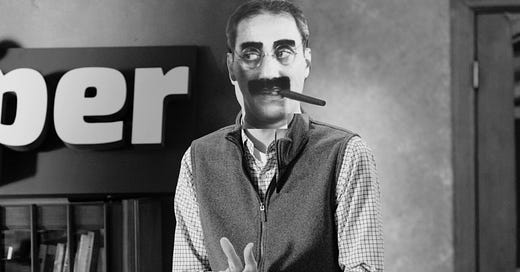This is a weekly newsletter about the art and science of building and investing in tech companies. To receive Investing 101 in your inbox each week, subscribe here:
If there's one trope that is common throughout teen angst its the idea that if you want someone to like you, treat them like dirt. Woven into that is a myriad of teenage psychological trauma, but it also isn't new. There's a common thread that represents a part of humanity. The best comedians capture aspects of what it means to be human, and this time is no exception. The person to capture this little nugget is Groucho Marx.
I've written before about this quote from the iconic comedian:
"I don't want to belong to any club that would accept me as a member."
Conveniently, that same piece I last talked about this quote was also about the psychology of VCs. That time, it was about wanting to be liked. But this time, its going the opposite direction. VCs, actually, thrive on being hated. As Zak Kukoff said, so eloquently in a tweet I also quoted last time, "all VCs are subs. The best founders are dom."
A Deal That Would Have Me As An Investor
VCs sit along a very strange spectrum between near absolute power and near absolute powerlessness. When a company is more desperate, they put a lot of power in a VCs hand. The same characteristics that make a company desperate are the characteristics that would make a VC pass. Customer concentration, bad growth, churn, negative customer reviews, employee turnover. The worse a company is, the more likely they are to offer a VC deference.
VCs are nothing if not pattern recognizers, right? So, whether consciously or subconsciously, they start to correlate deference as indicative of lower quality. The nicer you are to a VC, the more likely you are to be a bad company.
Now, the opposite is also true. The more a company is crushing it, the less deference they need to pay VCs. The more a founder ignores you, the more likely it is that the company knows its good. I don't know if this story is true, but I remember hearing stories about how, in the early days of Notion's inflection, some VCs sent them an unprompted term sheet and the Notion founders sent back a video of them lighting the term sheet on fire.
Once again, pattern recognition sets in. The meaner a founder is to a VC, the more likely it is the company is doing well. This goes on and on. The more good founders blow off VCs, the more VCs correlate that with success.
Unavoidable Diaspora of Deal Making
Like generational trauma, this cultural inclination towards self-loathing seems unavoidable. Because it isn't necessarily just hype. There are legitimate business factors that make a founder either blow a VC off or offer a lot of deference to them.
This informs how competitive rounds can be, how quickly a company is preempted, and how much VCs push value-adds like talent offering and story features. In many cases, this can become a self-fulfilling prophecy. Be mean to enough VCs and you may just will yourself into becoming a "hot company."
That's the reality of storytelling. The stronger a group of people believe something, and the bigger that group of people is, the more likely that thing is going to start getting reflected in reality. Just one necessarily reality of an inefficient market that is largely dictated by human emotions, whether founder or VC.
Thanks for reading! Subscribe here to receive Investing 101 in your inbox each week:






Well said. C.S. Lewis nailed this phenomenon in a Memorial Lecture at King’s College, University of London in 1944:
I believe that in all men’s lives at certain periods, and in many men’s lives at all periods between infancy and extreme old age, one of the most dominant elements is the desire to be inside the local Ring and the terror of being left outside…
Unless you take measures to prevent it, this desire is going to be one of the chief motives of your life, from the first day on which you enter your profession until the day when you are too old to care. That will be the natural thing—the life that will come to you of its own accord. Any other kind of life, if you lead it, will be the result of conscious and continuous effort. If you do nothing about it, if you drift with the stream, you will in fact be an “inner ringer.” I don’t say you’ll be a successful one; that’s as may be. But whether by pining and moping outside Rings that you can never enter, or by passing triumphantly further and further in—one way or the other you will be that kind of man…
You discover gradually, in almost indefinable ways, that it exists and that you are outside it; and then later, perhaps, that you are inside it…But you have met the phenomenon of an Inner Ring…
And you will be drawn in, if you are drawn in, not by desire for gain or ease, but simply because at that moment, when the cup was so near your lips, you cannot bear to be thrust back again into the cold outer world. It would be so terrible to see the other man’s face—that genial, confidential, delightfully sophisticated face—turn suddenly cold and contemptuous, to know that you had been tried for the Inner Ring and rejected. And then, if you are drawn in, next week it will be something a little further from the rules, and next year something further still, but all in the jolliest, friendliest spirit. It may end in a crash, a scandal, and penal servitude; it may end in millions, a peerage and giving the prizes at your old school. But you will be a scoundrel…
The desire to be inside the invisible line illustrates this rule. As long as you are governed by that desire you will never get what you want. You are trying to peel an onion: if you succeed there will be nothing left…
Exclusion is no accident; it is the essence.
Thanks for sharing. Its a weird power dynamic and worthy of reflection.
The hunter becomes the hunted becomes the hunter.